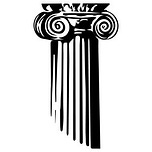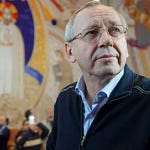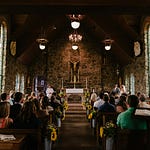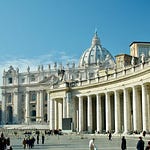JD and Ed talk about the situation of the Institute of the Incarnate Word and how the Institute may have shaped Pope Francis’ perspective on new religious movements.
This episode of The Pillar Podcast is brought to you by the University of Mary. Become a True Leader with an MBA from the University of Mary. Pillar paid subscribers receive an exclusive $10,000 scholarship.
Learn more at pillar.umary.edu


















A religious institute should only be allowed in a diocese where the bishop allows it. That would keep the powers given to the bishops by Vatican II in their hands while helping resolve problems within such institutes.
Why haven’t the specific canonical crimes Buela was found guilty of, and/or the specifics of abuse allegations against him, been released? As Ed noted, it must have been quite bad; but why not release that info so the IVE supporters can understand the measures taken to stop honoring his memory?
What happens to the priests/ sisters when a religious institute/order is suppressed? If the member isn't accused of a canonical crime or otherwise implicated in the bad governance, does he or she get the choice of going to another order or diocese or laicization?
If I recall correctly the post-1773 ex-Jesuits continued as diocesan priests while making the sure the groundwork for a reinstitution was left in place.
These guys were specifically told by the papal representative assigned to look into them not to form new communities after 2019, but ignored it, per the Pillar article about this. How then could our bishop introduce a community of IVE to our diocese in 2021/22, (under the specific suggestion of Fr. Stephen Rossetti, we were told, btw)? How many people/clegy out there are pointedly denying the authority of the Vatican under the pretense of "political persecution" of conservative Catholics? And isn't denial of the authority of Rome a heresy?
Denying the authority of Rome would certainly fall somewhere between tendentious and totally heretical, but disobeying Rome would not, of itself, be any kind of heretical. Kinda like how your kids can disobey you without rejecting the idea that you are their mother and have authority over them. And occasionally, you *want* them to disobey you, due to particular circumstances and hierarchies of principles.
Ecclesiastical authority also has varying levels, and limitations. There's always the question of whether people actually know about the orders. There's the questions regarding whether the orders were meant officially but was partly countermanded unofficially. There's the question of whether the order is actually a good idea to follow, and whether the person countermanding it has the authority to do so. (An example, though I'm not sure for exactly which of these, is Bishop Karol Wojtyla, who consecrated bishops in Poland contrary to the specific orders of the relevant Vatican department, which was trying to get either no Polish bishops, or bishops that wouldn't rile the commies.)
Very good podcast which raises at least several questions:
1. What is the current situation with the Heralds of the Gospel?
2. If the concepts expressed by a “charlatan “ are objectively valid, why would the character of the “charlatan” require that those concepts be put down the memory hole? Do I recall Balaam’s donkey, or Pilate’s writing “Jesus of Nazareth King of the Jews”?
3. Similarly, if the fruits of the tree are good, why dig down to examine the roots? Or perhaps, if there were flaws with the roots, do the good fruits show that the flaws did not render the whole tree bad?
4. In the case of religious institutes that are notably very masculine in tone, won’t the reforms that are instituted in response to the founder’s wrongs basically steer the institute to have a more feminine tone ?
5. Why are do so many men joining one or other Orthodox jurisdictions complain that their previous denomination was too feminized?
> Similarly, if the fruits of the tree are good, why dig down to examine the roots? Or perhaps, if there were flaws with the roots, do the good fruits show that the flaws did not render the whole tree bad?
Every branch that bears fruit is pruned so that it bears more. It is legit to examine roots, therefore, even if the branch is bearing some fruit.
Just one correction: The Spanish dilemma was by a breakaway group of Poor Clares (Franciscans), not Carmelites. It's still madness though.
One of the best shows in a while - I love when y'all piece together several long-running stories, and draw out the underlying stories beneath the simple facts of the news.
I think this is one of the best episodes of the pillar! Everything is explained so well and it’s definitely a story worth following. Please continue to do episodes about this topic.